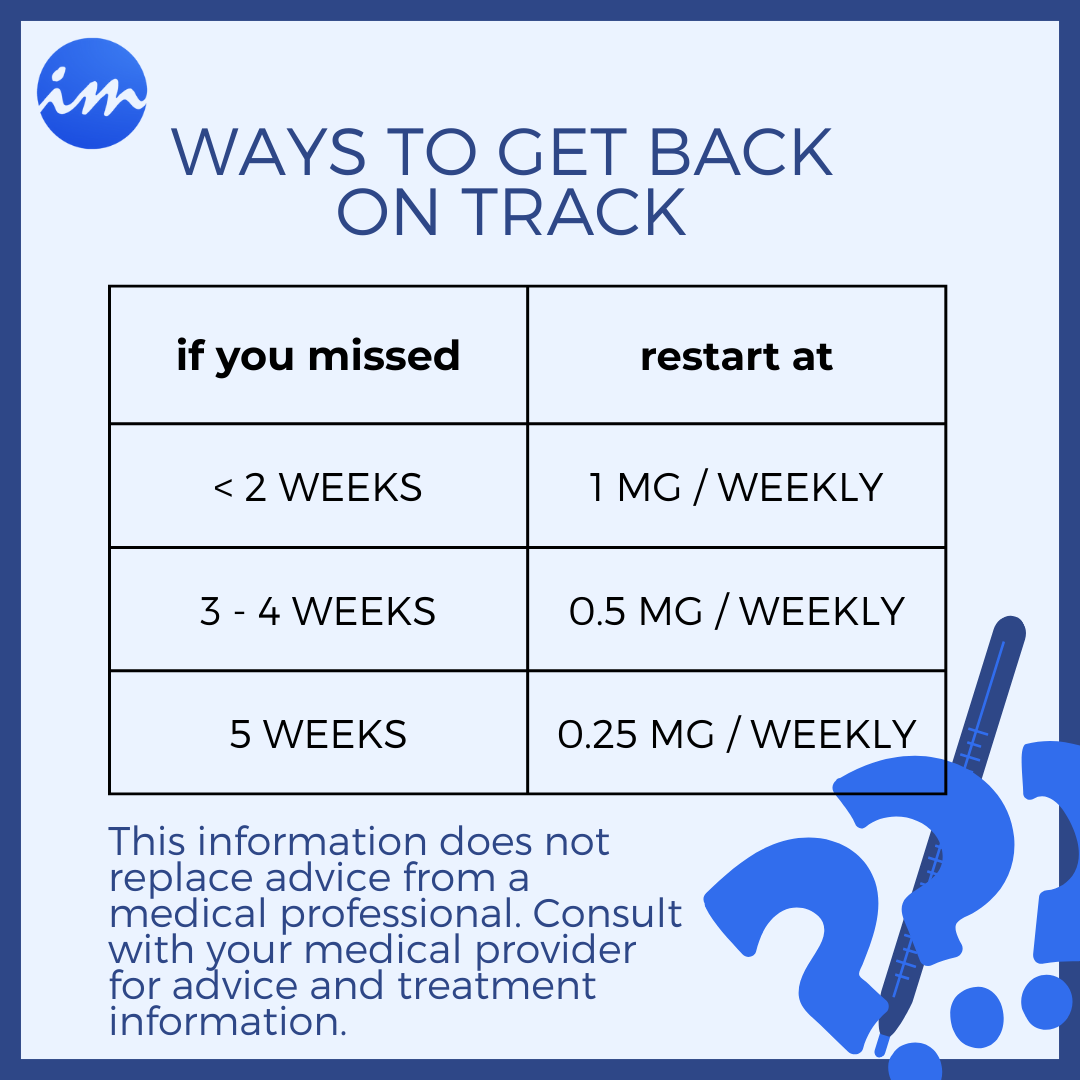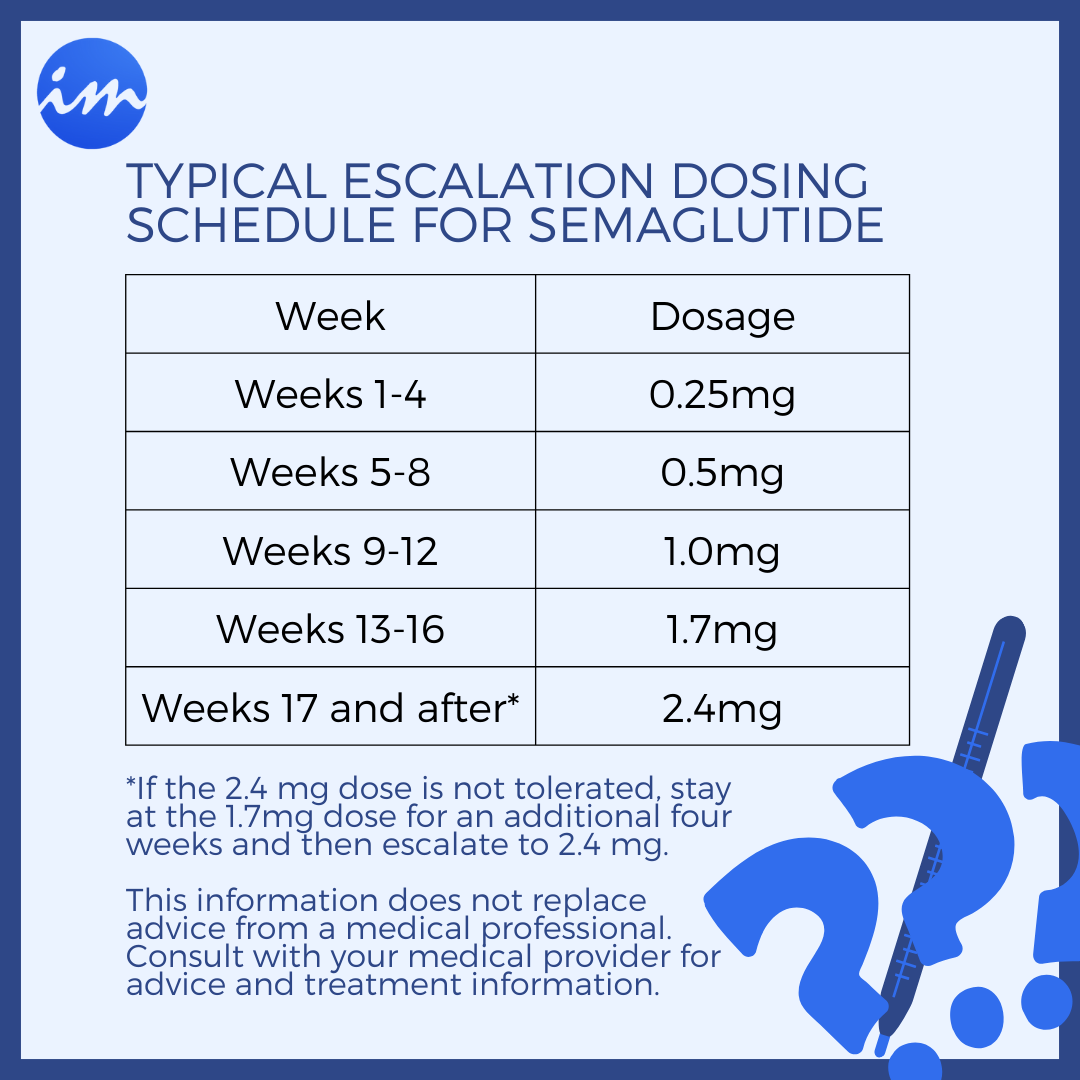So you’ve stopped taking semaglutide, and you’re wondering how you can get back on track to lose weight.
Getting back on the track depends on a few factors, like how long you’ve taken the drug and how long you’ve been off.
Walk through this guide to get back on track with your weight loss journey.
Table of Contents
How Semaglutide Works
Semaglutide is a glucagon-like peptide-1 (GLP-1) receptor agonist that mimics the natural hormone in your body.
This hormone has a significant role in regulating blood sugar levels, stomach (gastric) emptying, and appetite. Along with lifestyle changes like diet and physical activity, taking semaglutide may result in significant weight loss.
Doctors initially prescribed semaglutide to patients for type 2 diabetes management since OzempicⓇ (the brand name for semaglutide) received FDA-approval. Now, semaglutide is also prescribed for long term weight management.

What Happens When You Miss Semaglutide Dosages
Life happens, and you miss a dose or a few doses.
You may notice an increased appetite as your body is adjusting to the lack of medication. If you’ve stopped long enough, you may even notice weight gain.
Research suggests that when patients discontinue semaglutide, they may regain about two-thirds of the weight they previously lost.
Dosing Guide Info for Restarting Semaglutide
Medical experts have laid out a detailed description of how to restart semaglutide. We’ve put it in plain English and an easy-to-read table below.
As always, consult with your healthcare provider before restarting a new dose or stopping.

What if I’ve missed less than one week?
If you miss a dose and the next scheduled dose is more than two days away, take the missed dose as soon as possible after consulting with your medical professional.
If more than five days have passed since the missed dose, skip the dose and resume semaglutide on the regularly scheduled dosage day with the guidance of your doctor.
What if I’ve missed more than one week?
If you’re already taking semaglutide 1 mg once a week, experts suggests the following restart semaglutide plan:
- If you missed 2 weeks or less, restart semaglutide at 1 mg (same dose) once weekly.
- If you missed 3 – 4 weeks, restart semaglutide at 0.5 mg (half-dose) weekly.
- If you missed 5 weeks or more, restart semaglutide at 0.25 mg (starting dose) once weekly.
Restarting semaglutide at too high a dose or escalating the dose too quickly may cause excessively slow stomach emptying.
As a result, you may feel uncomfortable side effects such as nausea, vomiting, bloating, and heartburn.

Typical Dosing and Dosing Escalation Schedule
A typical semaglutide starting dose is 0.25 mg for Weeks 1-4 leading up to 2.4 mg weekly doses at weeks 17 and beyond.
Here is a table depicting a typical dosing and escalation plan
Semaglutide Dosing Schedule
| Week | Dosage |
| Weeks 1-4 | 0.25mg |
| Weeks 5-8 | 0.5mg |
| Weeks 9-12 | 1.0mg |
| Weeks 13-16 | 1.7mg |
| Weeks 17 and after* | 2.4mg |
*If the 2.4 mg dose is not tolerated, stay at the 1.7mg dose for an additional four weeks and then escalate to 2.4 mg.

Always speak to your doctor before making changes to your dosing schedule.
Help Avoiding Potential Side Effects
Restarting semaglutide may mean starting fresh with certain side effects and symptoms.
However, you may reduce the risk, severity and frequency of these side effects by gradually increasing your weekly semaglutide dosage.
Most common side effects
Most common side effects of semaglutide and GLP-1s are:
- Nausea
- Vomiting
- Diarrhea
- Constipation
- Abdominal pain
- Headache
- Fatigue
- Indigestion
- Dizziness
- Bloating
- Gastroenteritis
Most side effects are transient and mild to moderate in intensity.
These side effects may be more common at the onset of taking the drug and when increasing the dose.
Other Important Safety Information
Semaglutide has other potential risks that should be taken into account. For instance, semaglutide may increase the risk of developing thyroid tumors, including cancer.
You shouldn’t take semaglutide if you or any of your family have had any type of medullary thyroid cancer (MTC) or endocrine system conditions or multiple neoplasia syndrome type 2 (MEN 2).
What’s Next?
Sometimes we need help starting again, we hope this guide points you in the right direction.
Next Step? Determine where you are and decide to speak with a healthcare professional. You should be in clear communication with your healthcare provider about your semaglutide doses.
Disclaimer
Invigor medical provides compounded drug medications. Compounded medications are not approved by the FDA for safety or efficacy. Please consult your physician to determine if a prescription is right for you.













